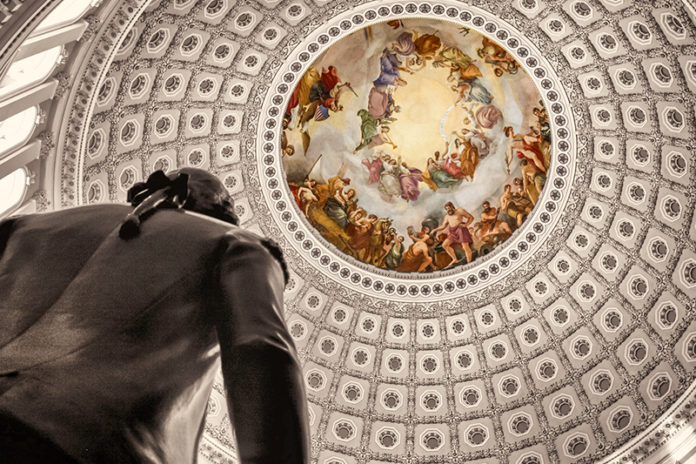Donald Trump’s presidency was the era when liberals learned to love federalism. From California to Massachusetts, governors and legislatures in blue states decided that resistance to federal dictates was a crucial way to uphold progressive policies.
Those were the good old days. With Democrats in control of both Congress and the White House, they have reverted to their historic fondness for making policy in Washington for all 50 states. The notion of letting states go their own way, in keeping with the preferences of their citizens, has suddenly lost its charm. It’s a shift liberals may come to regret, for more reasons than one.
And it is a shift. Under Trump, left-leaning states enacted assorted policies that had no chance of getting approved by a Republican Senate and president. Some raised the minimum wage; some tightened gun laws; some legalized recreational cannabis. Several sued the administration over its rules on immigration — the quintessential federal responsibility.
California forged an agreement with five automakers to set stricter emission standards than those approved by Trump. When COVID-19 arrived, many governors adopted restrictions that offended the president, provoking his trademark venomous tweets. California Gov. Gavin Newsom said, “So when you ask, ‘are we going to rely on the federal government, or are we gonna rely on ourselves,’ we’re going to rely disproportionately on ourselves.”
All this had echoes of an earlier era. Wrote liberal legal scholar Jeffrey Rosen, “Democrats and liberals are returning to a tradition of ‘progressive federalism’ that they favored before the New Deal and the Great Society — and that they began to revive during the second Bush administration.”
The movement traced back to what liberal Supreme Court justice Louis Brandeis wrote in 1932: “It is one of the happy incidents of the federal system that a single courageous state may, if its citizens choose, serve as a laboratory; and try novel social and economic experiments without risk to the rest of the country.”
The renewed appreciation of federalism limited Trump’s capacity to force his demands on states that saw him as a reactionary tyrant. More importantly, it strengthened a foundational principle of our constitutional system: that many powers and responsibilities properly lie with state and local governments.
Upholding federalism is crucial in a nation as large and diverse as ours. What passes as common sense in New York or Hawaii often contradicts the prevailing wisdom in Texas or Wyoming — and vice versa.
If we want New Yorkers and Texans to coexist on civil terms, residents of both places need latitude to govern themselves. Decreeing uniform policies across the country creates a winner-take-all battle that deepens divisions instead of closing them. It also inhibits experiments that could offer lessons to change minds in other states.
But President Joe Biden has not been converted to the cause. He revoked the authority of states to impose work requirements on Medicaid recipients. His spending plans include more federal money for infrastructure projects that states have chosen not to finance. He supports a bill to neutralize “right to work” laws letting employees opt out of joining unions and paying union dues. All these policies substitute federal policies for state ones.
Sometimes, such as cases of fundamental liberties and public health emergencies, Washington has an obligation to intercede. When Texas passed a law aimed at violating abortion rights affirmed by the Supreme Court, Biden’s Justice Department had no choice but to file a lawsuit to overturn it.
Climate change, which transcends state borders, requires national (and international) solutions. Biden’s COVID-19 vaccine mandate on private employers fits with the Occupational Safety and Health Administration’s longstanding obligation to protect employees from “grave dangers” in the workplace.
The need for Washington to set policy on some crucial matters doesn’t mean it should do so on everything. In many instances, the feds butt in simply because they disapprove of some states’ policies.
But sharp political differences are not an argument against the value of federalism. They are an argument for it. Federalism minimizes the conflict between blue states and red states by sparing each from living under policies that they reject. If people in Georgia want right-to-work laws and people in Illinois don’t, why not let each have its way within its own borders?
Democrats have learned that when they are out of power in Washington, federalism is a vital protection. But if you want that protection, the time to strengthen it is when you are in power.






























